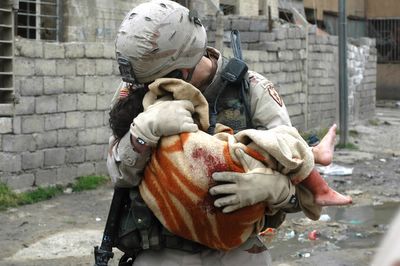There is even some resentment (highlighted below, emphasis mine) that Bush keeps 9-11 foremost in our minds when reminding us of the need for constancy. I can't believe that they would have had such a problem with FDR invoking the memory of Pearl Harbor keep America focused on pursuing the difficult European theater of WW II against Germany, obviously not involved in Pearl Harbor.
We did not expect Mr. Bush would apologize for the misinformation that helped lead us into this war, or for the catastrophic mistakes his team made in running the military operation. But we had hoped he would resist the temptation to raise the bloody flag of 9/11 over and over again to justify a war in a country that had nothing whatsoever to do with the terrorist attacks.More:
No one wants a disaster in Iraq, and Mr. Bush's critics can put aside, at least temporarily, their anger at the administration for its hubris, its terrible planning and its inept conduct of the war in return for a frank discussion of where to go from here. The president, who is going to be in office for another three and a half years, cannot continue to obsess about self-justification and the need to color Iraq with the memory of 9/11. The nation does not want it and cannot afford it.At what point do the critics see that our unity against our enemies is of greater importance than a war conducted to their refined sensibilities. Intelligence and the fog of war do not allow for the certainity of knowing lies beyond our vision at this point. But, with enemies certainly resolved and enabled to strike us and our allies, and have struck since 9-11, what side do the critics want to error on? Bush has chosen. And I am glad he did. Let's stick to it. His critics embolden desperate enemies and indicate a lack of understanding the enemy, as Rove jokingly said. In so doing, they seem to say that they would rather error on the side of the enemy.




